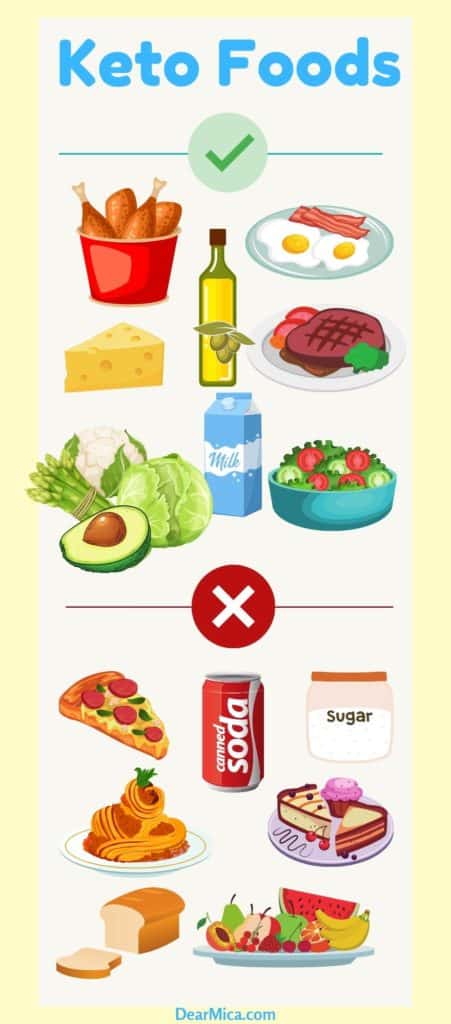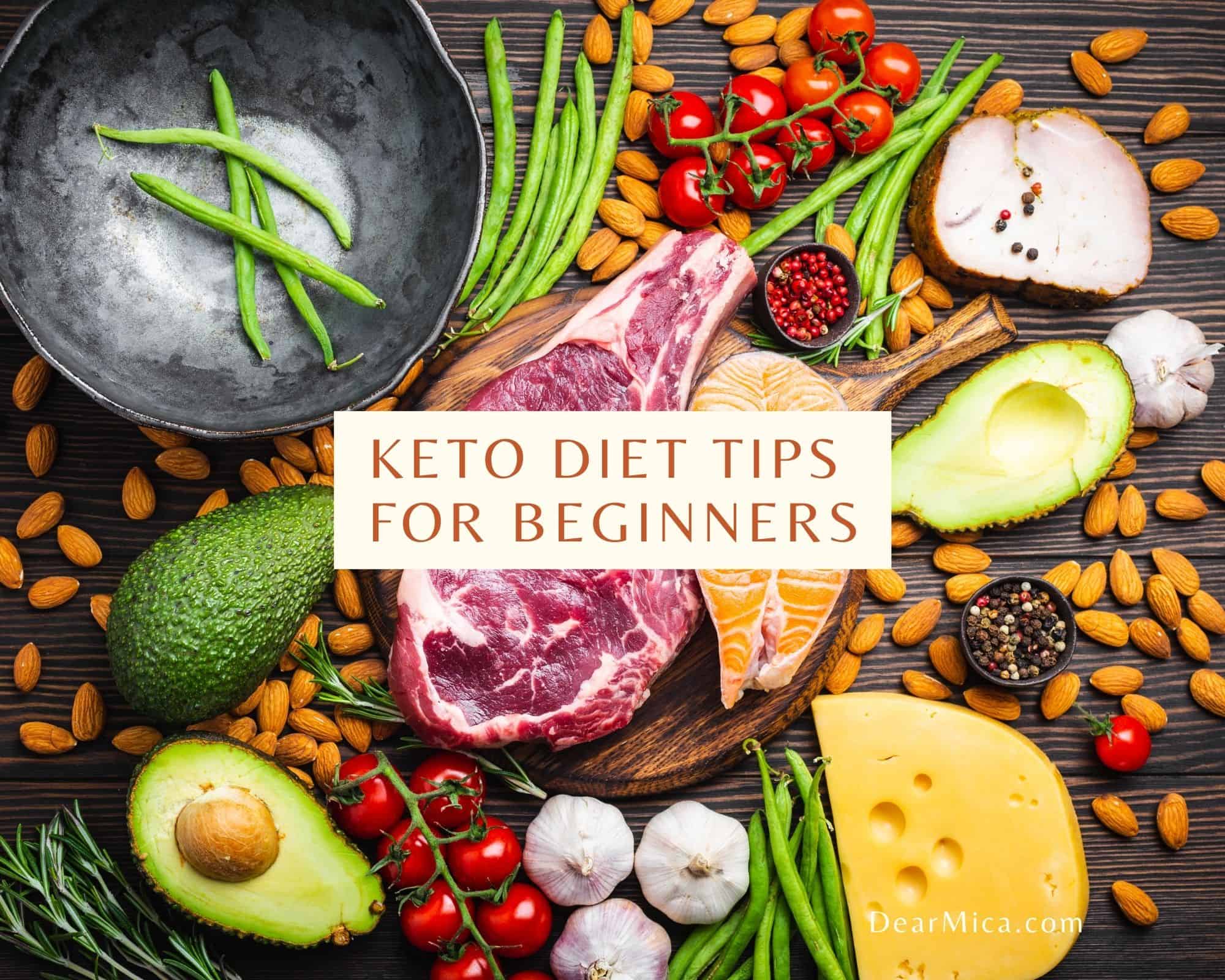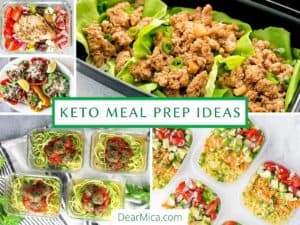Looking for Keto diet tips for beginners to start your weight loss journey? The ketogenic diet has become one of the most popular ways to lose weight and improve overall health.
Here you will find easy and actionable Keto diet tips for beginners to get you started on your journey.
To make the most sense and to give you context, read what is a keto diet first before reading the following my keto diet tips suggestions.
This post is meant to help you kick-start into becoming an efficient Keto machine and get the most out of your ketogenic diet.
Each one of these effective tips have been tested on myself as well as my friends and family who have tried it. I am sure they will work for you too!
Here are simple yet actionable Keto diet tips that will take you from being a rookie to mastering the art of Keto.
Keto Diet Tips for Beginners
1. Simple is the goal

Keep it simple, especially when you’re just getting started. Have the confidence to start with a solid plan.
Make small changes that you can live with over time. You’ll be more likely to stay with it and experience long-term results that will mean better health for you and your family.
For those looking to start keto, the simplest approach to go about doing so is with a basic structure for their meals:
- Choose a source of protein. – What kind of meat do you want to have? Choose your favorites. Beef, chicken, turkey, pork, lamb, fish, seafood, eggs, etc.
- Choose vegetables that are low in carbs. – Cauliflower, broccoli, zucchini, spinach, avocado, cucumbers, asparagus, bell peppers, etc.
- Don’t forget fat. Oil (olive oil, avocado oil, coconut oil), lard, tallow, butter, ghee (clarified butter), cheese, bacon, avocado, mayonnaise, heavy cream, etc.
2. Temptations should be removed

One of the best ways to make sure you are following the keto diet is to get rid of food that you should not eat. It is much easier if you are not eating food that tempts you all the time.
For me I find it is much easier just to not have the food in the house. If it’s there it will be calling my name lol.
Get rid of these things in your fridge and pantry:
- Sugar: including table sugar, candy, pastries, cakes, ice cream, chocolate, soda, juice, honey, maple syrup, etc.
- Junk food of any kind: Cookies, chips, “healthy” bars, etc.
- Grains: Pasta, breakfast cereals, wheat, rice, corn, oats, granola, etc.
- Beans/Legumes: Of any kind. These includes lentils, peas, soybeans, beans, chickpeas, etc.
- Vegetables that are high in carbs: Potatoes, sweet potatoes, carrots, corn, parsnips, etc.
- Fruit that is high in sugar/carbs: Fruits are generally high in fructose Apricots, pears, melons, apples, pineapples, mangoes, etc.
- Dried fruits: Raisins, cranberries, dried apricots, dried plums, etc.
- Juices: It is a misconception that fruit juices are healthy. They are packed with sugar and fructose.
- Vegetable oils: This are very inflammatory to the body. Corn oil, canola oil, soybean oil, etc.
Get the family to eat healthier with you.
If they are not into keto diet, at least keep better choices in the house. If it’s not there they wont be eating it.
3. Keep your fridge stocked
The more keto friendly food that’s in there, the better. This is a good way to make sure you have something when you get home from work, or when you wake up in the morning. It can be easy to stick with eating healthy if you always have good snacks at your disposal!
- Healthy fats: Like coconut oil, olive oil, lard, tallow, ghee, bacon fat, etc.
- Leafy greens: Like lettuce, spinach and kale. This low carb veggies can be easy to prep and will keep for a week in your fridge.
- Low carb vegetables: That grow above ground, like zucchini, cauliflower and asparagus and cabbage. full of nutrients, minerals and vitamins and are known to support healthy digestion.
- Meats: Like beef and pork, bacon and sausages. Packed with protein and healthy fats.
- Poultry: Like chicken and turkey. They are a good source of protein and amino acids.
- Seafood Like salmon, sardines and shellfish full of omega-3’s fatty acids and protein.
- Full-fat dairy like cheese and heavy cream and cottage cheese. Cheese is a great snack if you are hungry between meals. Make sure it’s full fat and not flavored with fruit though…that kind of defeats the purpose lol
- Eggs: Whole eggs should be part of your daily fat intake. They are the perfect keto-approved whole food!
4. Eat only when hungry

When should you eat if you are not hungry? Ketosis functions as a natural appetite suppressant, so you may find that you don’t feel hungry.
Listen to your body. If you are not hungry, then don’t eat.
Eating a meal without hunger may be a big problem if it happens sporadically. Do not let yourself get overly hungry either, because this may trigger uncontrolled eating and an excess of calories (especially in the form of carbs).
Eating only when hungry, not every time you think of food, will keep your blood sugar stable and your body in fat-burning mode.
The hunger scale is different for each person and can take some time to adjust to.
It’s common to experience increased hunger in the first few days of ketosis.
This usually subsides within 3-4 weeks, but it can still take a few weeks to get used to this.
Related: Benefits of Ketosis
5. Stay hydrated
Everyone benefits from drinking water, but it is especially beneficial when you are in ketosis.
Your body needs water to function, and you will find you are extremely thirsty.
This is because when your body begins to burn fat instead of glucose, you are losing a lot of water weight.
Also, when you burn fat, you are dumping a chemical called acetone from your body.
Acetone is known to have a distinct smell and often smells like nail polish remover.
This means you will be dehydrated more often than usual in the beginning of your keto journey.
As you begin to lose fat, your body becomes more efficient at using the water it has.
This is why people who are overweight tend to feel better than they used to when starting out on keto.
It’s very easy to get dehydrated without knowing it, so always keep a bottle of water nearby when starting out on keto.
You will find yourself urinating more than usual in the beginning as well. This is also a result of your body losing water weight.
After a few weeks on keto – around one month – your hydration levels will stabilize, and the frequency of urination will lessen.
6. Plan your meals ahead of time
It might sound boring at first, but having a menu planned out for the week will save you a lot of time and stress, and it helps ensure that you’re eating keto-friendly all week long.
Carbs are everywhere in our culture… Carbs in breads, carbs in sauces or marinades, carbs even in meats when fried with batter!
You will need to plan ahead so that you can pack your meals full of veggies, proteins, and healthy fats.
Check out some of my keto meal prep ideas, to get your week started off right.
Related: Easy Keto Dinners
Keto Diet Tips for Beginners Conclusion
Having a meal plan ahead will help you stay on track with your healthy lifestyle goals without all the stress, and it’ll save you time too!
So don’t be afraid to try something new like going keto, whatever works best for you!
Let me know how I can support your journey towards optimal health and wellness.
Happy Keto!!







